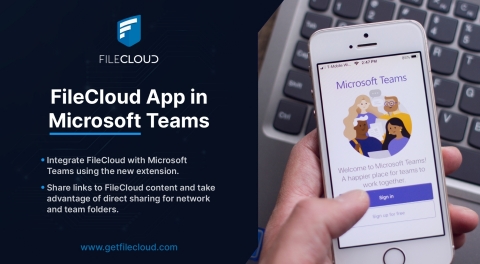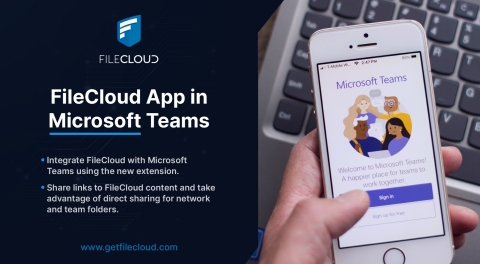AUSTIN, Texas--(BUSINESS WIRE)--The developing hybrid work model has placed a spotlight on collaboration software, as companies look for ways to mix and match tools for employees scattered across multiple locations.
The latest version of FileCloud’s cloud-agnostic enterprise file sync, sharing and data governance platform seamlessly integrates with Microsoft Teams, so that organizations can easily share files and links from a single workspace. FileCloud is flexible enough to be self-hosted on-premises, operated as IaaS, or accessed in the cloud.
“FileCloud’s intuitive connection with Microsoft Teams creates a smooth bridge between file storage and secure sharing,” said Madhan Kanagavel, FileCloud’s founder and CEO. “If we can eliminate context-switching by putting everything people need to get work done together in one place, we can make this hybrid model more efficient.”
Most apps in the Microsoft Teams App Marketplace work only with online services, but the FileCloud app can access files stored in on-premise network shares, storage appliances and the FileCloud Online service.
After a quick install to set up the FileCloud extension in Teams, users can continue chatting with peers, managers, and stakeholders while sharing information and files from FileCloud’s secure environment. Those shared links automatically incorporate FileCloud’s range of security features like password protection, link expiration and download caps.
There’s also a tab for FileCloud in the sidebar menu of Microsoft Teams that provides users with full information on their files—including metadata, comments and version history—eliminating the need to switch back and forth between a browser and Teams.
The solution works for any industry. Manufacturing teams can share project schedules, diagrams, and requirements with designers and coordinators within the Microsoft environment. Or real estate firms can easily communicate large contracts or small addendums between clients, lenders and agents.
FileCloud 21.2, featuring Microsoft Teams Integration, is now available. For more information, visit getfilecloud.com.




